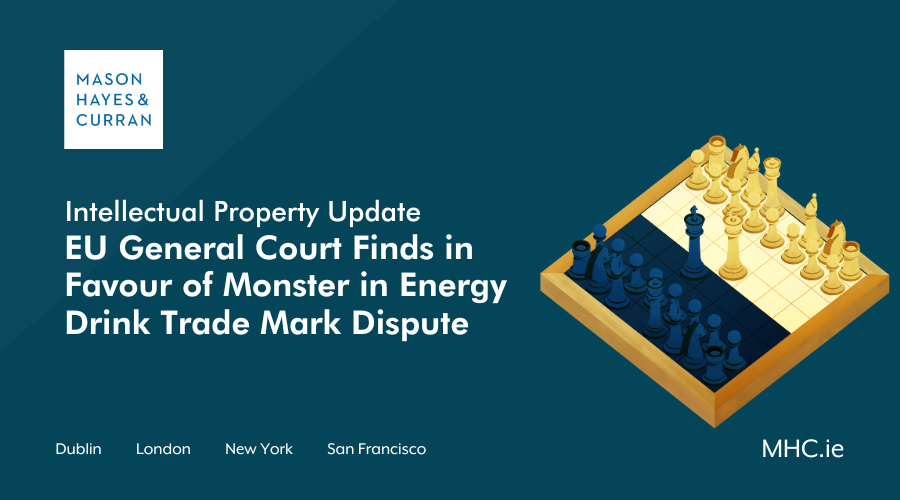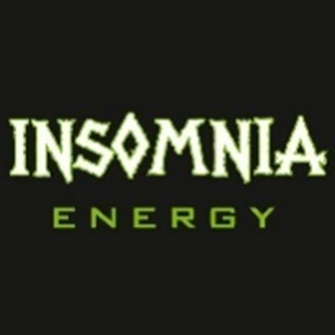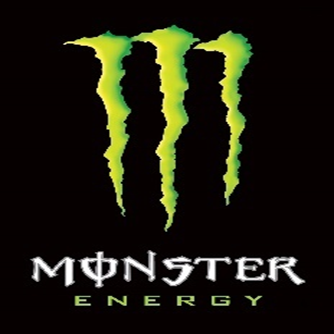EU General Court Finds in Favour of Monster in Energy Drink Trade Mark Dispute

Unleash the Beast! Monster Energy has successfully invalidated a copycat trade mark registration in the EU for INSOMNIA ENERGY protecting energy drinks. Our Intellectual Property team considers the key takeaways for brand owners.
Further to our recent article reporting on a trade mark dispute in the US involving Monster Energy (Monster), the energy drink giant has again received a favourable court decision. The ruling related to an IP dispute. This time, the General Court of the EU has upheld Monster’s claim that a rival trade mark for ‘INSOMNIA ENERGY’ should be invalidated. We analyse the EU General Court decision and provide the key takeaways for businesses in the food and beverage sector.
Background
Monster filed an invalidity application in December 2022 with the EUIPO against the below trade mark, which was registered in January 2017.

The above mark was registered for a wide range of beverage products in Class 32 including:
- “non alcoholic beverages flavoured with coffee”
- “energy drinks”, and
- “energy drinks containing caffeine.”
The invalidity application was based on Monster’s pre-existing EU trade mark registration for the below MONSTER ENERGY mark. This mark was registered in January 2013 and protected “non alcoholic beverages” in Class 32.

At first instance, in December 2022, the EUIPO Cancellation Division dismissed the application for invalidity. It found that there was no likelihood of confusion between the marks. It also said that the signs were too dissimilar for members of the public to draw any connection between them. Monster appealed the decision.
Board of Appeal decision
The EUIPO Board of Appeal upheld the appeal and declared the INSOMNIA ENERGY mark to be invalid. The Board was satisfied that Monster could demonstrate a strong EU reputation for its energy drinks trademark. The Board of Appeal also found that given the similar structure of both marks and the fact that both use the word ‘energy’, they were visually similar. In addition, for the part of the relevant public that would pronounce and understand the word element ‘energy’, the competing marks had a low degree of phonetic and conceptual similarity. The Board of Appeal found Monster Energy's strong reputation outweighed the minimal similarities between the trademarks. The owner of the INSOMNIA ENERGY mark, BFF Company EOOD, appealed to the General Court of the EU.
General Court decision
By written judgment in October 2024, the General Court of the EU ruled in favour of Monster and dismissed the appeal in its entirety. In doing so:
- It dismissed the argument that the Board of Appeal relied solely on the colour green when considering the overall impression of the marks. Rather, it held that the Board of Appeal relied on the general appearance of the marks. The Board noted that the similarity was reinforced through use of the same black, green and white colours. Additionally, the marks had a similar structure and the word elements were positioned in the same way in both marks.
- It held that although the word ‘energy’ has a weak distinctive character when used on energy drinks, the word will not go unnoticed due to its size and colour.
It was satisfied that the evidence submitted by Monster contained objective information. This included invoices confirming its market share, screenshots from websites, and articles and reports on media coverage. The evidence also highlighted its broad promotional activities at miscellaneous global sports events. The evidence made it clear that the global marketing campaigns portray the image of the earlier MONSTER ENERGY mark worldwide. Drinks bearing that mark are sold in every Member State of the EU, in numerous retail stores and outlets. For those reasons, it rejected the applicant’s argument that there was no evidence to show that the Monster trade mark is known in the EU in the field of energy drinks.
Comment
The General Court decision serves as a reminder of the value of invalidity actions, where opposition deadlines have expired and competing similar marks have proceeded to registration. The decision represents a win for Monster. However, BBF Company EOOD could decide to appeal the General Court decision to the European Union’s top Court, the Court of Justice. Brand owners in the food and beverage sector should take the following key points from the case:
- This case illustrates that there is merit in registering trade marks to protect colourful packaging, and that trade mark registrations can be used to defeat copycats even where the word marks appearing on the competing signs are different.
- It is of critical importance to maintain accurate records/evidence of use of trade marks. Files of evidence should be regularly maintained and updated, and these should be easily accessible in the event a third party challenges a registration.
- In the event of a dispute, always seek legal advice from IP experts. Although the applicant in this case had legal representation, the Court was critical that the applicant’s comments in the pleadings were vague and that they lacked explanation. Further, the pleadings did not develop specific arguments. For example, to dispute the Board of Appeal’s assessment on the issue of unfair advantage and repute of the earlier MONSTER ENERGY mark.
- Trade mark watching services are an invaluable asset to track similar and copycat applications, protecting identical goods or services to your own registrations.
For more information and expert legal advice on how best to protect your intellectual property rights, please contact a member of our award-winning Intellectual Property team.
People also ask
Can a trade mark application be filed in bright colours? |
Yes, it is possible to file a trade mark application in any colour or multiple colours, or in black and white. If colours are used, arguably this makes a trade mark more distinctive. |
Is it expensive to file a trade mark application? |
The costs of filing trade marks will vary depending on the territory in which you are filing and the number of classes of goods and services to be protected by the application. For further details on trade mark costs, please contact a member of our Intellectual Property Team. |
Why is it important to protect trade marks? |
Trade marks serve as indications of origin. If they are not registered and protected, third parties may be able to take advantage of your key logos and marks, which may ultimately dilute the value of your brand and result in you losing those rights, which may have previously represented a valuable business asset. |
The content of this article is provided for information purposes only and does not constitute legal or other advice.
Share this:


